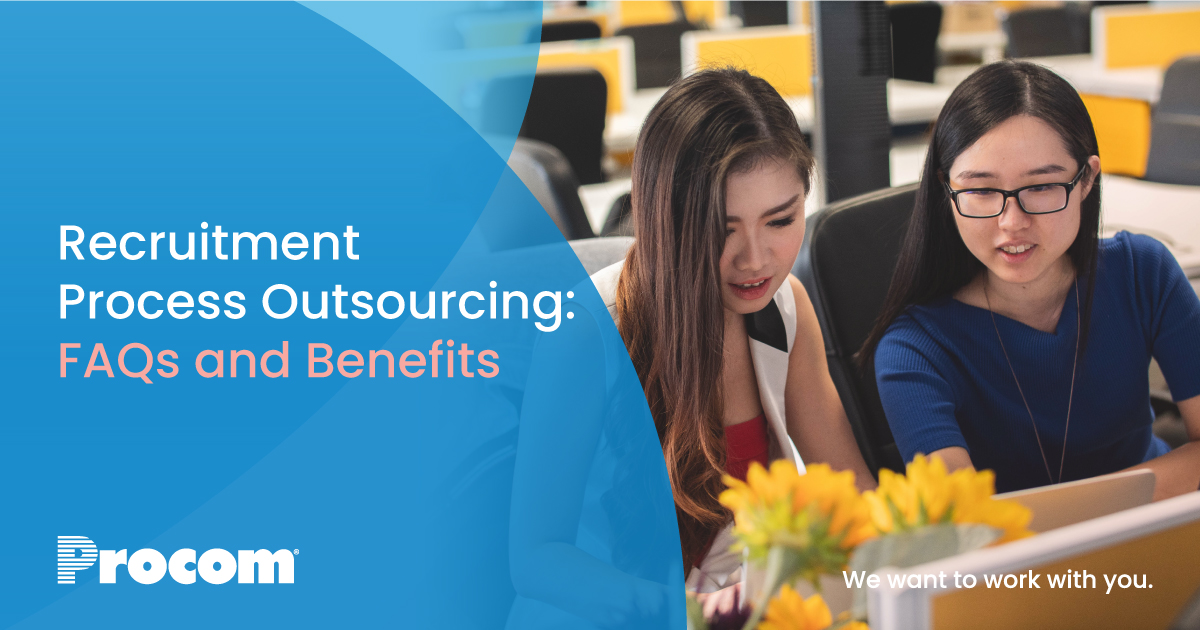Recruitment Process Outsourcing definition
Recruitment Process Outsourcing (RPO) is a business strategy whereby an organization transfers all or part of its recruitment efforts to an external vendor. A trusted RPO partner will take ownership of the recruitment program design and execution of the recruitment process.
What is Recruitment Process Outsourcing? and Why is RPO important?
When an organization is looking to hire, even in today’s uncertain climate, recruitment processes don’t have to be scary – a defined Recruitment Process Outsourcing strategy will add consistency and compliance when recruiters and talent acquisition teams are sourcing top talent in today’s new normal.
Recruitment Process Outsourcing or RPO is a business strategy that aims to reduce costs, increase quality of talent pools and drive efficiency and scalability within an organization’s traditional employment model. An RPO partner will use their own, or the client organization’s, staff, technology stack and reporting process to find and manage talent.
What’s the difference between Business Process Outsourcing (BPO) and Recruitment Process Outsourcing (RPO)?
Business Process Outsourcing is when a company engages a third-party provider to manage an internal business function. The third party provider, such as a staffing agency, will control the talent acquisition process but also will manage the performance and output using Key Performance Indicators (KPIs) and Service Level Agreements (SLAs).
An RPO provider, however, will also control the talent acquisition process for a company, but it does not manage the performance or output.
Why would an organization invest in Recruitment Process Outsourcing?
Even before the coronavirus swept across the globe, navigating the recruitment landscape was a complex task. In order to source and engage top talent in an uncertain labor market, recruiters and talent acquisition teams must become experts in nurturing candidates, learn how to use innovative technology and continuously hone relationship building skills with hiring managers.
An RPO provider is made of subject-matter-experts who have the knowledge and experience required to not only navigate the recruitment landscape, but also keep current with technologies and frequent changes to government legislation. When a company is outsourcing their recruitment efforts and transfers all or part of the process to an RPO provider, it can experience an improvement in hiring manager satisfaction and a reduction in time-to-hire, an improved employer brand and a heightened candidate experience among other benefits.
When managed well with a trusted RPO partner, Recruitment Process Outsourcing can reduce cost to hire by 20 per cent and deliver cost savings of more than 50 per cent.
Is an RPO a one size-fits all service?
No! Depending on an organization’s needs, there is more than one RPO model available for employers to choose from.
Project-based RPO
This arrangement happens when a trusted relationship has been built between the client company and the RPO team. The RPO is aware of the organizations requirements and employer brand, and as such is engaged to fill a defined number of position within a set period of time
On-demand RPO
Similar to a Project-based RPO engagement, this happens when only one or two outsourced recruiters are engaged by an organization to acquire talent for a specific project within a specific timeframe.
Function-based RPO
This happens when a company engages an RPO team to acquire talent for a specific department, such as the IT or sales department, or and entire division.
End-to-end RPO
This happens when a RPO team has control of the client company’s entire recruiting efforts with full access to the organization’s resources.
How much does it cost to outsource recruitment?
There is no flat industry-based fee for RPO services. Instead, the cost of engaging a RPO team will depend on an organization’s needs, goals and the RPO provider itself. However, it’s important to compare costs between a RPO and an organization’s internal Human Resources Department, and when doing so, it’s important to consider more than the monetary savings. This means taking into consideration the value of relinquishing control of certain aspects of the recruitment process to experts, enabling internal staff to better develop their own roles.
Before engaging a RPO partner, an organization should also consider:
• Do you have a team dedicated strictly to talent acquisition or is recruitment spread out among general HR professionals or department managers among the company?
• Do the internal stakeholders involved in the hiring process hold those doing the recruiting to Service Level Agreements (SLAs) or other performance metrics?
• Does your organization have visibility into internal reporting and tracking of recruitment metrics
• Do those doing the recruiting in the organization specialize in any niche markets or technology stacks?
• What department is responsible for your internal recruitment function – HR or Procurement or both.
What to expect from an RPO provider
An experienced RPO provider will incorporate recruiters, technology and best talent acquisition practices to transform how a client company acquires and manages traditional talent. To do so, an RPO provider will provide end-to-end recruitment process solutions from the initial sourcing efforts to onboarding, while also ensuring the organization’s overall recruitment goals are achieved.
Through this outsourcing strategy, a company can gain many advantages. Engaging a RPO provider as a dedicated human resources provides the following benefits:
Reduction in cost-per-hire
An RPO can significantly reduce the average cost-per-hire by more than 50 per cent.
Less time to hire
An RPO can reduce the time it takes to onboard talent by over 40 per cent.
Access to expertise and better talent
As experts in their field who are well-versed in building and maintaining relationships with talent, an RPO provider has access to talent pools and high-quality talent around the globe. They also implement world-class assessments, procedures and policies to measure candidate quality in order to make more date-driven and informed hiring decisions.
Additional sourcing channels
Organizations that operate with a niche sector will require workers with niche skills. An RPO provider will typically have access to untapped sourcing channels.
Improved scalability
Outsourcing to an RPO provider allows employers to scale their workforce to market demand.
When an organization engages the right RPO partner with the right RPO model, they’re gaining a competitive advantage over the competition with enhanced recruitment expertise.
The Voice of Talent: Return to the Office Report
Procom recently surveyed over 1,000 knowledge workers to discover how and where they prefer to work as offices re-open across North America.
The Voice of Talent Report offers actionable insights into what workers expect in relation to mandatory vaccinations, remote work preferences, The Great Resignation, COVID-19 safety measures and more.
Access your complimentary copy to discover how to attract talent in a post pandemic world:






